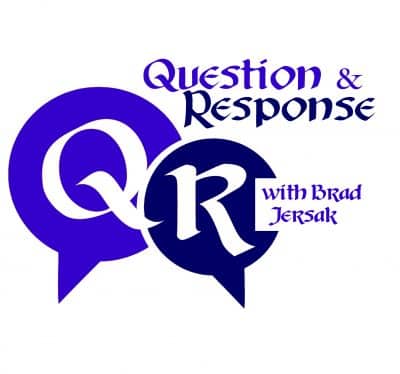Q&R with Brad Jersak – “Can we withhold God’s forgiveness?

Question
What is your take on John 20:23?
“If you forgive anyone’s sins, their sins are forgiven; if you do not forgive them, they are not forgiven.”
Response
That’s a very difficult verse. Of course, the first part seems easy enough. Up until that point, there was this sense that only God could forgive sin (Mark 2:7), so Jesus’ critics were upset when he would announce (in the passive voice), “Your sins are forgiven.” They claimed it was tantamount to blasphemy. But note, he didn’t say, “I forgive you,” but rather, spoke the words as the Son authorized by his Father. Even on the Cross, we hear Jesus praying, “Father, forgive them,” rather than saying directly, “I forgive you.”
Yet in our culture, we have this sense that we can and need to directly forgive. Where did we get that idea? Perhaps from this verse! That through the Holy Spirit, we can offer the word of forgiveness. That said, Jesus had already taught his followers that they needed to forgive others as the Father had forgiven them. Our role in forgiving those who’ve wronged us is central to the Lord’s Prayer.
But here, Jesus seems to go a step further. He’s implying that we can now speak a word of forgiveness, not only for ourselves, but have also been given authority to do so on behalf of God himself!
Historically, Christianity has taken this very role seriously as part of its healing ministry. As stewards of the gospel, we can offer God’s word of forgiveness to those trapped in fear, guilt, and shame. As servants of Christ, we can extend the forgiveness achieved through the Cross to those who seek to experience it. It’s not that we forgive in our own authority, but because Christ has granted his followers this privilege… basically we are saying, “I have no power in myself to forgive, but I can boldly share the good news that God in Christ already has.”
The second part of the verse is strange. It sounds like Jesus is saying that we also have the power to withhold forgiveness. And maybe we do in some strange way, perhaps in calling people to honestly face the truth of the harms they’ve done rather than saying, “No problem.” I think of a man who had battered his wife so badly that the bones in her face were broken and we thought she would lose one of her eyes. The man wanted to participate fully in our faith community without acknowledging wrongdoing, pretending nothing had even happened. We had to say, “Hang on a second, here…”
It’s not that we could undo the words from the Cross: “It is finished.” But somehow, Christ has also given us a responsibility to make it clear that our experience and practice of forgiveness are tied to acknowledging our need for it.
The apostle John knew this. In his first epistle, chapter 1:8-10, he says, “If we claim to be without sin, we deceive ourselves, and the truth is not in us. If we confess our sins, he is faithful and just and will forgive us our sins and purify us from all unrighteousness. If we claim we have not sinned, we make him out to be a liar and his word is not in us.”
So there’s the truth of our forgiveness, established completely at the Cross.
And there’s the way of our forgiveness, experienced in the context of our honest confession.
Now, given that this forgiveness was complete, one wonders what will happen if we refuse to ‘remit’ the sins of those who honestly seek forgiveness. Eugene Peterson, the translator of the Message Bible, provides a bit of commentary in his translation that, whether inspired or not, has been of some help and a word of caution to me when I’m stingy with forgiveness:
“Then he took a deep breath and breathed into them. “Receive the Holy Spirit,” he said. “If you forgive someone’s sins, they’re gone for good. If you don’t forgive sins, what are you going to do with them?” John 20:22-23
In my experience, as long as I refuse to release someone’s sins, I end up bearing them as a heavy burden of resentment. And, as Jesus said, “The standard you use in judging is the standard by which you will be judged” (Matthew 7:2). Note again, how Jesus uses the passive voice. Not “My Father will judge you” (John 5:21) or “I will judge you” (John 8:15). Generally, it’s our heart or conscience that condemns us (1 John 3:20) and seems to do so as long as imprison others in our judgments. Far better that we align with the Redeemer rather than the accuser, freely extending the mercy we have received.











 Plain Truth Ministries | Box 300 | Pasadena, CA 91129-0300
Plain Truth Ministries | Box 300 | Pasadena, CA 91129-0300

